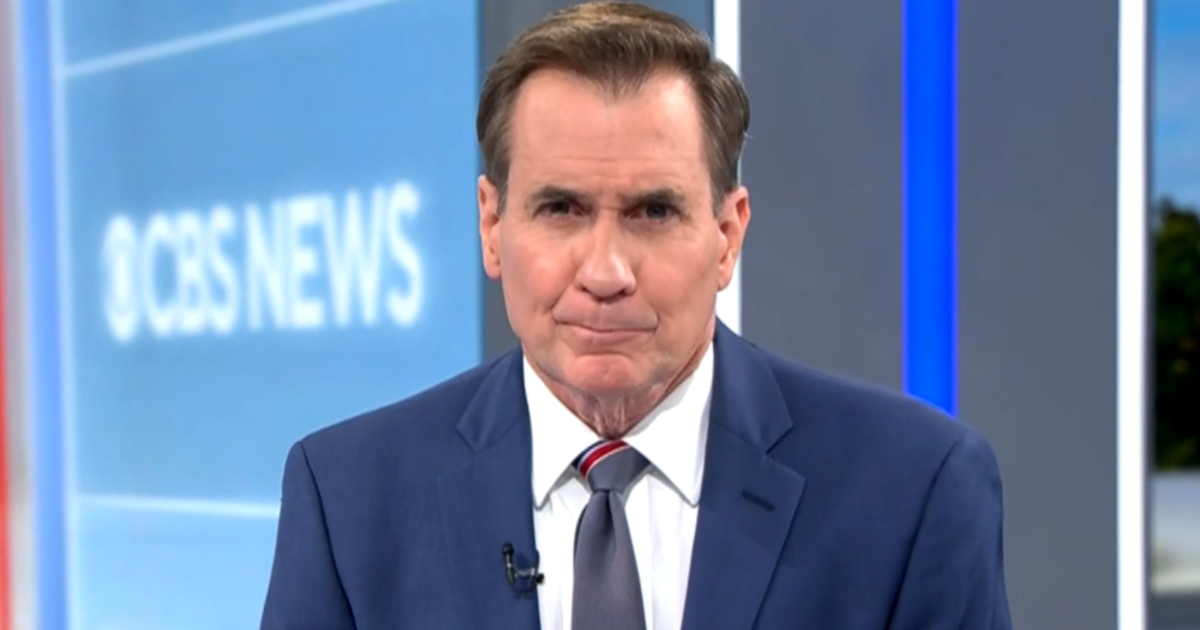
The following is the transcript of an interview with Admiral John Kirby, White House National Security Council Coordinator for Strategic Communications, broadcast April 14, 2024.
MARGARET BRENNAN: And we turn now to the coordinator of strategic communications at the White House National Security Council, John Kirby. Hello and welcome back.
STRATEGIC COMMUNICATIONS COORDINATOR, NATIONAL SECURITY COUNCIL, JOHN KIRBY: Thank you, Margaret, good to be with you.
MARGARET BRENNAN: Well, do you think that Iran intended these strikes to be successful and deadly or that they just seemed like they could be?
KIRBY: No doubt. I’m going to look at the size and scale of what they fired at Israel from Iran proper. Over 300 missiles and drones, they wanted to cause damage, there’s no doubt about it. But they absolutely did not succeed.
MARGARET BRENNAN: Well, Israel clearly has the military advantage here. But the Israeli foreign minister said a few days ago that if Israel responded, if Iran attacked from its territory, as you just said, that’s exactly what it would have done. So, has Israel made a commitment to the United States to warn before acting against Iran?
KIRBY: I don’t think I’m going to go into detail about the conversation we had last night between the president and the prime minister. It was a good conversation really focused on the incredible success that Israel achieved last night with its partners. I mean, two people really think things are clear about last night: First, Israel is not alone and the United States stands with them and the others. And second, the Israeli army has superior capabilities to defend itself. But as for next steps, I think I’ll leave that to the Prime Minister and the War Cabinet to talk about.
MARGARET BRENNAN: And this War Cabinet meeting is underway. But… But I asked, because, as you know, the United States has a significant presence in the region, troops in Iraq, in Syria, in Jordan…
KIRBY: – We do indeed.
MARGARET BRENNAN: And that carries a risk.
KIRBY: Absolutely.
MARGARET BRENNAN: And you said, and the Pentagon spokesperson said, that the United States was not informed in advance by Israel before carrying out the April 1 attack that started this chain of attacks. ‘events. Should they have warned the United States? And as a matter of principle, what is the American position on the bombing of what Iran considers a diplomatic facility?
KIRBY: Again, I won’t talk about the details of this particular strike. More broadly, obviously, we have a lot of troops in Iraq and Syria going after ISIS, we have a lot of installations elsewhere in the region and ships being sent out to sea. What’s happening there has so certainly an effect on us. And we want to make sure that…
MARGARET BRENNAN: –The level of risk has increased.
KIRBY: The conversations – we want to make sure that the conversations we have with the Israelis are as contextual as possible, so that we can make the necessary preparations for our own troops and installations. The other message that the president has sent in recent days, and it was certainly discussed last night, is that we are going to take every step necessary to protect our troops, our ships, our installations in the region going forward. And that was the case last night, before last night’s strikes, and it will be the case today.
MARGARET BRENNAN: Should the United States be prepared to withdraw its presence from one of our diplomatic facilities or to reposition itself?
KIRBY: This is a conversation that the President and Secretary Blinken are having literally in real time. They also talked about it yesterday. I will not speak for Secretary Blinken and the State Department. They will make these kinds of force protection decisions when they see the threat in the region. But the threat changes from time to time. And… and you always monitor that.
MARGARET BRENNAN: But I know you don’t want to get into a phone call between leaders. But the fundamental premise of what we’re talking about here is blowback for the United States. So, do you have reason to believe that Prime Minister Netanyahu shares a desire not to further aggravate the situation, which the President has clearly indicated is his intention?
KIRBY: I would say that the Prime Minister is well aware that the President is not looking for a conflict with Iran, that the President no longer wants tensions to escalate, and that his president is doing everything, and has been doing so since 7 d October, to try to prevent this from escalating into a larger regional war. I mean, one of the reasons we were able to help the Israelis destroy so many missiles and drones is because the president made the decision in recent days to preposition additional ships in the Eastern Mediterranean and an additional fighter squadron in the area that… it literally had a huge impact on last night…
MARGARET BRENNAN: –To deter what could have been worse.
KIRBY: To avoid a greater sense of destruction inside Israel.
MARGARET BRENNAN: Would the United States participate in offensive action in the event of Israeli retaliation?
KIRBY: I’m not going to get into hypotheticals, Margaret, like I said…
MARGARET BRENNAN: –In principle?
KIRBY: The President – the President has been clear: We are not seeking war with Iran. We are not seeking a broader regional conflict and everything we have done since the 7th has been designed to prevent that outcome.
MARGARET BRENNAN: Because the IRGC chief of staff said on television that he had sent a message to the United States through the Swiss embassy saying that if the United States participated in Israeli retaliation, the American bases and personnel would not be in the security zone.
KIRBY: Yeah. Aware of the comment contained in the statement. Again, I’m just going back to what I said earlier: we are not looking for a war with Iran, nor a broader regional conflict. But the other thing that the president has made clear is that we will do what we need to do to help Israel defend itself, as we did last night, and we will do whatever we need to do to ensure that our troops, installations and ships at sea in the region are also protected. We are also interested in the region. And obviously, we’re all focused on Israel, and rightly so. But we have broader national security interests in the Middle East. We have a posture of strength that we constantly monitor to ensure we can meet these interests. The president takes this seriously. And this was also communicated to Iran.
MARGARET BRENNAN: And the Iraqi prime minister will be at the White House this week to talk about…
KIRBY: – Tomorrow. Tomorrow.
MARGARET BRENNAN: This presence of troops also…
KIRBY: –Tomorrow, tomorrow. Yes, we plan to have a good discussion not only on force posture, but also on the mission defined in Iraq and what that looks like. I think, you know, it’s a consultancy mission.
MARGARET BRENNAN: Yes.
KIRBY: This is about helping the ISIS defense forces and their operations pursue ISIS in Iraq.
MARGARET BRENNAN: Mossad announced this morning that Hamas had rejected this latest offer to release the hostages, saying it proved that Yahya Sinwar, Hamas’ leader in Gaza, did not want a deal. Does the United States share this assessment? Is diplomacy dead? Or is this just another bump in the road?
KIRBY: We do not consider diplomacy dead. There’s a… a new deal on the table that Director Burns negotiated about a week ago in Cairo. It’s a good deal. This would allow dozens of the most at-risk women, elderly people and the wounded to be released, and would give us a six-week ceasefire. So a little more calm and let’s give ourselves the opportunity to deliver more humanitarian aid. Hamas leaders must accept this agreement. And we don’t consider it dead at this point.
MARGARET BRENNAN: Okay. So the rejection of Mossad does not close the door?
KIRBY: We don’t consider it dead – a dead letter.
MARGARET BRENNAN: Okay. Last Sunday, when you were here, you told us that the United States planned to have talks with Israel, perhaps as early as this week, about its plans to go to southern Gaza, to Rafah. When does it happen? Do we have more details?
KIRBY: We think that this discussion… first of all, there have been discussions at the technical staff level, even since the last time you and I spoke. We hope that this broader conversation with our Israeli counterparts will take place in the coming days, hopefully this week.
MARGARET BRENNAN: Hopefully this week.
KIRBY: I hope this week.
MARGARET BRENNAN: John Kirby, thank you very much.
KIRBY: Thank you.
Grub5





